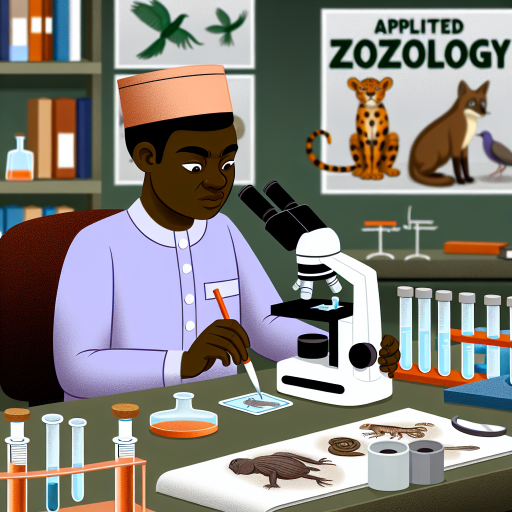Applied Biology curriculum in Nigerian universities focuses on practical aspects of biological sciences.
Studying Applied Biology in Nigeria is crucial for addressing local environmental and health issues.
Students learn how to apply biological principles to real-world problems, preparing them for diverse career opportunities.
History and Evolution of Applied Biology Curriculum in Nigerian Universities:
Applied Biology curriculum in Nigerian universities has evolved significantly over the years.
It has adapted to the changing needs of the society and advancements in the field of biology.
Here, we will trace the development of the Applied Biology curriculum in Nigerian universities.
We will highlight key milestones and changes over the years.
Early Years:
- The Applied Biology curriculum in Nigerian universities can be traced back to the early years of the establishment of higher education institutions in the country.
- During this period, the focus was mainly on foundational biological concepts and principles.
- There was an emphasis on theory rather than practical applications.
- Students were equipped with a strong background in basic biology, botany, zoology, genetics, and microbiology, among other foundational subjects.
Transition Period:
- As the field of biology evolved and interdisciplinary approaches became more prominent, the Applied Biology curriculum in Nigerian universities underwent a transition.
- There was a shift towards integrating practical applications of biology into the curriculum.
- This shift focused on preparing students for real-world challenges and opportunities.
- New courses and modules were introduced to address emerging areas in biology, such as biotechnology, environmental science, bioinformatics, and genetic engineering.
Recent Developments:
- In recent years, the Applied Biology curriculum in Nigerian universities has continued to evolve to meet the demands of a rapidly changing world.
- There is a greater emphasis on practical training, research skills, and hands-on experience.
- This training relates to the application of biological concepts to solve real-world problems.
- Modern technologies and tools are now integrated into the curriculum.
Key Milestones and Changes:
- The introduction of specialized courses in biotechnology, genetic engineering, and bioinformatics marked a significant milestone in the evolution of the Applied Biology curriculum.
- Collaborations with industry partners and research institutions have provided students with opportunities for hands-on training.
- These collaborations also allow exposure to real-world applications of biology.
- There has been a shift towards more project-based learning.
The history and evolution of the Applied Biology curriculum in Nigerian universities reflect the dynamic nature of the field.
It shows the need to adapt to changing trends and developments.
The curriculum has evolved from a focus on theoretical concepts to a more practical and interdisciplinary approach.
This approach prepares students for a wide range of career opportunities in the field of biology.
Structure of Applied Biology Curriculum:
When it comes to the structure of the Applied Biology curriculum in Nigerian universities, it is essential to understand the breakdown of courses offered in these programs.
The curriculum is designed to provide students with a solid foundation in biological sciences while also emphasizing practical and hands-on learning experiences to prepare them for real-world applications in various industries.
Breakdown of Courses Offered:
In Applied Biology programs, students typically take a wide range of courses that cover various aspects of biology, including genetics, microbiology, biochemistry, and ecology.
These courses are designed to provide students with a comprehensive understanding of biological processes at a molecular, cellular, and organismal level.
One of the key features of the Applied Biology curriculum is the integration of interdisciplinary courses that combine biology with other fields such as chemistry, physics, and environmental science.
This multidisciplinary approach allows students to develop a holistic understanding of biological systems and their interactions with the environment.
Emphasis on Practical Learning Experiences:
In addition to theoretical coursework, Applied Biology programs also place a strong emphasis on practical and hands-on learning experiences.
Students are required to participate in laboratory sessions, fieldwork, and research projects to enhance their scientific skills and critical thinking abilities.
These practical experiences allow students to apply their theoretical knowledge in a real-world setting, gaining valuable insights into the practical applications of biology in various industries such as biotechnology, pharmaceuticals, agriculture, and environmental conservation.
By actively engaging in hands-on activities, students develop important laboratory techniques, experimental design skills, and data analysis capabilities that are essential for a successful career in applied biology.
The structure of the Applied Biology curriculum in Nigerian universities is designed to provide students with a well-rounded education that combines theoretical knowledge with practical skills.
By offering a diverse range of courses and emphasizing hands-on learning experiences, these programs prepare students to address complex biological challenges and make meaningful contributions to scientific research and innovation in Nigeria and beyond.
Explore Further: Top Universities Offering Bioinformatics in Nigeria
Outdated Curriculum
One of the major challenges facing the Applied Biology curriculum in Nigerian universities is the presence of an outdated curriculum.
The curriculum may lack relevance to current trends in the field, leading to gaps in students’ knowledge and skills.
Lack of Resources
Another significant challenge is the lack of resources such as laboratory equipment, research materials, and funding.
This shortage hampers practical training and limits students’ exposure to real-world applications of biology.
Limited Research Opportunities
Nigerian universities often face limited research opportunities in the field of Applied Biology.
This lack of research initiatives impacts students’ ability to engage in practical research projects, which are essential for skill development and innovation.
Impact on the Quality of Education
The challenges facing the Applied Biology curriculum in Nigerian universities have a direct impact on the quality of education in the field.
The outdated curriculum restricts students’ access to up-to-date knowledge and skills, hindering their preparedness for the job market.
Lack of resources further exacerbates this issue by limiting hands-on training and practical experience, which are vital components of a comprehensive biology education.
Students may lack the necessary skills to excel in their careers due to inadequate resources.
Moreover, the limited research opportunities impede students’ ability to explore new ideas, conduct experiments, and contribute to scientific advancements.
This lack of exposure to research hinders their growth as future scientists and innovators.
These challenges collectively weaken the Applied Biology curriculum in Nigerian universities.
As a result, graduates may not meet industry standards or contribute significantly to the field.
Addressing these issues is crucial to improving the quality of education and fostering innovation in Applied Biology.
You Might Also Like: The Role of Zoology in Nigeria’s Environmental Conservation
Transform Your Career with Expert Guidance
Get personalized mentorship consulting that’s tailored to your unique path. Our expert advice is actionable and exclusive.
Get StartedStrategies for Improving Applied Biology Curriculum:
First and foremost, it is essential to identify the specific challenges present in the current applied biology curriculum.
This could include outdated content, lack of practical experience, or limited exposure to modern technologies.
Once these challenges are recognized, they can be effectively addressed through targeted interventions.
One effective strategy for improving the applied biology curriculum is to establish partnerships with industry stakeholders.
By working closely with companies in the field, universities can ensure that their curriculum remains relevant and up-to-date.
Industry partners can provide valuable insights into the skills and knowledge that students need to succeed in the workplace.
Another key aspect of enhancing the applied biology curriculum is to incorporate more hands-on learning opportunities.
Practical experience is crucial for students to develop the skills they need to excel in their chosen field.
By including laboratory exercises, fieldwork, and internships, universities can better prepare students for real-world challenges.
In order to keep pace with advancements in the field of applied biology, it is important to incorporate modern teaching techniques into the curriculum.
This could include the use of digital learning tools, interactive simulations, and online resources.
By leveraging technology, universities can enhance the learning experience for students and ensure they are exposed to the latest developments in the field.
A diverse range of specializations within the applied biology curriculum can cater to the individual interests and career goals of students.
By offering specialized tracks or concentrations in areas such as biotechnology, environmental biology, or genetics, universities can provide a more tailored educational experience.
This allows students to delve deeper into specific areas of interest and develop expertise in their chosen field.
Universities should actively promote research and innovation within the applied biology curriculum.
By encouraging students to engage in research projects, participate in scientific conferences, and collaborate with faculty members on cutting-edge research initiatives, universities can instill a culture of creativity and exploration.
This hands-on approach not only enhances students’ understanding of the subject matter but also prepares them for careers in research and development.
To ensure that the applied biology curriculum remains relevant and competitive, universities must stay updated with emerging trends in the field.
This includes monitoring advancements in biotechnology, ecology, molecular biology, and other related disciplines.
By staying abreast of new developments, universities can adapt their curriculum to reflect the latest innovations and equip students with the knowledge and skills needed to succeed in a rapidly changing industry.
Finally, universities can enhance the applied biology curriculum by offering professional development opportunities to students.
This could include workshops, seminars, conferences, and networking events that expose students to industry professionals and experts.
By providing students with access to these resources, universities can help them build their professional networks, gain valuable insights into the field, and prepare for successful careers in applied biology.
Gain More Insights: Professional Bodies for Geophysicists in Nigeria

Opportunities for Applied Biology Graduates in Nigeria:
Applied Biology graduates in Nigeria have a wide range of career prospects in various industries and sectors.
The skills and knowledge acquired through their programs make them valuable assets in the following areas:
Agricultural Sector:
- Opportunities exist for Applied Biology graduates in the agricultural sector, where they can work in research, crop management, pest control, and food production.
- They can also venture into agribusiness, sustainable agriculture, and biotechnology to contribute to the growth and development of the agricultural industry in Nigeria.
Environmental Sector:
- Applied Biology graduates can work in environmental conservation, pollution control, and natural resource management.
- They play a crucial role in addressing environmental challenges, such as climate change, deforestation, and biodiversity loss, through research and sustainable practices.
Pharmaceutical Industry:
- Graduates with a background in Applied Biology can pursue careers in the pharmaceutical industry, particularly in drug development, testing, and quality control.
- They can work in pharmaceutical companies, research institutions, and regulatory agencies to ensure the safety and efficacy of medications.
Biotechnology Sector:
- Applied Biology graduates are well-suited for roles in the biotechnology sector, where they can work in genetic engineering, bioprocessing, and bioinformatics.
- They contribute to advancements in medicine, agriculture, and environmental protection through the application of biotechnological techniques.
Healthcare Industry:
- Graduates can pursue careers in healthcare, such as clinical laboratory science, public health, and medical research.
- They play a vital role in disease diagnosis, prevention, and treatment, as well as promoting health and well-being within communities.
The opportunities for Applied Biology graduates in Nigeria are diverse and promising, with ample room for growth and impact in various industries and sectors.
Discover More: Advances in Environmental Microbiology in Nigeria
Case Studies of Successful Applied Biology Programs in Nigerian Universities:
University of Ibadan:
The University of Ibadan has an exemplary Applied Biology curriculum.
Students have access to cutting-edge research facilities.
Graduates have gone on to make significant contributions to scientific advancements.
The program emphasizes hands-on learning and practical application of concepts.
Ahmadu Bello University:
Ahmadu Bello University offers a robust Applied Biology program.
The university has strong industry partnerships for research collaborations.
Students engage in internships and fieldwork to apply theoretical knowledge.
Graduates have excelled in various fields such as biotechnology and environmental science.
University of Lagos:
The University of Lagos is known for its innovative Applied Biology curriculum.
The program focuses on interdisciplinary approaches to biological research.
Students have opportunities to participate in real-world projects.
Alumni have made significant contributions to sustainable development and healthcare.
Obafemi Awolowo University:
Obafemi Awolowo University has a successful Applied Biology program.
The university emphasizes practical skills development and critical thinking.
Students participate in research projects that address societal challenges.
Graduates have pursued careers in biomedicine, agriculture, and conservation.
Federal University of Technology, Akure:
The Federal University of Technology, Akure offers a dynamic Applied Biology curriculum.
The program integrates technology and biology for innovative solutions.
Students collaborate with industry partners on research and product development.
Alumni have launched successful startups and research initiatives.
University of Nigeria, Nsukka:
The University of Nigeria, Nsukka has a comprehensive Applied Biology program.
The curriculum includes courses on biotechnology, genetics, and microbiology.
Students engage in hands-on experiments and field studies.
Graduates have been involved in groundbreaking research projects and conservation efforts.
Implications of a Dynamic Applied Biology Curriculum
We have discussed the challenges and opportunities in the Applied Biology curriculum in Nigerian universities.
The importance of a robust and dynamic curriculum cannot be overemphasized.
It is crucial for Nigerian universities to continuously update their Applied Biology curriculum.
This ensures alignment with industry demands and global trends.
Such updates will guarantee that graduates are well-equipped for the evolving job market.
Emphasizing practical skills and critical thinking is key.
A strong Applied Biology curriculum can produce adaptable and innovative graduates.
These graduates will approach scientific research and application effectively.
A well-designed curriculum can bridge the gap between academia and industry.
This approach fosters collaborations that drive research and development across various sectors.
A holistic approach to the Applied Biology curriculum benefits students significantly.
This contributes to the advancement of the field and the nation’s socio-economic development.
It is imperative for academia, industry, and government stakeholders to work together.
Continuous improvement and relevance of the Applied Biology curriculum are essential.
Investing in this crucial aspect of education ensures that Applied Biology graduates can address societal challenges.
They will make meaningful contributions to scientific knowledge and technological advancement.
Additional Resources
Computational Biology and Bioinformatics in Nigeria – PMC
Ph.D. in Applied Biology | Biological Sciences | Kennedy College of …




